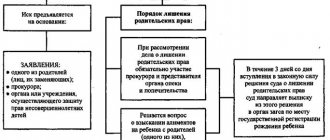Is it possible to voluntarily renounce paternal or maternal rights?
A citizen acquires rights in relation to a minor at the time of registration of the child’s birth. The basis is the entry of data at the request of the parents or by court decision. From the moment the information is included in the children's documents, the mother and father are granted parental rights.
Important! Exclusion of information about the mother and father from children's documents is possible only by court decision.
Options for voluntary renunciation of paternal or maternal rights:
1. Permission to adopt. If other citizens wish to accept the child into the family, the parents can provide written consent. In this case, it is not necessary to deprive the mother or father of parental rights. The adoption procedure will take less time. Since when depriving parental rights, you must wait 6 months from the moment the court decision is given legal force.
The disadvantage of such adoption is the impossibility of receiving payment when adopting a child left without parental care. Since a minor does not receive the appropriate status.
2. Challenging parental rights. If other citizens do not want to adopt a child, then the refusal can be formalized in the form of challenging paternity or maternity. But this option is possible if the applicant is not the blood parent of the minor. And also at the time of registration of the relationship, I did not know about the absence of consanguinity.
Thus, the usual execution of a document with the renunciation of paternal or maternal rights does not carry the corresponding latter. The procedure must be carried out through the court.
Example. Kirill wants to give up his son. A man is divorced from his ex-wife. The boy lives with his mother. The man does not want to communicate with the child and pay child support. He turned to a notary and formalized the notarized abandonment of the child. After which, he presented the document to the FSSP to stop the collection of alimony. However, the specialist refused him.
The law does not provide for the possibility of waiving the father's rights. They can either be transferred or contested. In other cases, if duties are not fulfilled, a man may be deprived of paternal rights. But the obligation to provide financial support will remain.
What does the letter of the law say?
The law does not accept voluntary relinquishment of parental rights; there is no such article in the RF IC . Having written a waiver on the sheet, you should not consider yourself free as soon as the court makes a verdict, although, according to statistics, most claims on this topic are satisfied - there will be no refusal from the payment for the maintenance of the baby , the money will have to be transferred anyway.
There are families in which the head of the family oppresses the fragile teenager so morally and physically that the mother is ready to ask the father to renounce paternity.
If there is a contender for the place of the head of the family who will be happy to take on all the worries about someone else’s baby by adopting him , then why not do this for the common good, the only problem is in the father’s already occupied place, which he agrees to vacate of his own free will.
Art. 69,70,71 of the RF IC regulates the deprivation of parental rights, and abandonment of a child, in fact, is equivalent to deprivation of the rights of a parent .
An application to the court must be drawn up according to the rules prescribed in Art. 131 Code of Civil Procedure of the Russian Federation. The course of the trial must comply with the format of the requirements of paragraphs. 4 paragraphs 1 art. 23 and 24 Code of Civil Procedure of the Russian Federation.
Non-biological father's refusal
In some cases, a man is included in children's documents as a father, in accordance with the law. If there are grounds, the specialists of the Civil Registry Office do not clarify the man’s opinion:
- mother and father are officially married;
- at the time of the birth of the newborn, 300 days have not passed since the date of divorce.
In addition, the man could submit a joint application to the registry office, not knowing that he is not the blood parent of the minor. From this moment on, he bears all the responsibilities of an official father, including financial support. Let's look at how to waive the rights of a parent to the father and not pay child support.
If a man knows for certain that there is no blood connection with the child, then he has the right to go to court to challenge paternity. The procedure is carried out in a city or district court.
The state fee for the court is 300 rubles. The citizen is obliged to prove his point of view. One of the main evidence is the result of genetic testing. Payment for the study is borne by the applicant.
If alimony was previously collected from a citizen, then it is necessary to include in the application a request to cancel the decision. If the woman reliably knew that the applicant was not the father, but collected the funds, she can demand the return of previously paid alimony.
After the court decision has been given legal force, it is necessary to take it to the FSSP and submit an application for the cancellation of alimony. Otherwise, the funds will continue to be withheld.
The child has not yet been born, but the husband is already refusing him - what to do?
Do not rush to make hasty decisions and terminate the pregnancy. Remember that inside you have a new life, your little blood, and your Great mission to give birth and raise this person. A father's abandonment of a child does not mean that you cannot raise him on your own.
If a man has left you and you are in a position, then, if possible, seek help from a psychologist. You can also find support from loved ones, relatives or friends. They will help you in difficult times, support and comfort you.
Try to avoid communicating with those people who are negative towards your pregnancy and the whole situation as a whole, who constantly repeat “I told you so...”, “You should have listened to me...”, etc. Such words will definitely not bring any benefit, and will only further aggravate your psychological state. Now the only person you can rely on is you.
Mother's refusal
A woman can renounce maternal rights in the following cases:
1. Abandonment of a newborn in the maternity hospital. It can be personal (in favor of a specific person) or general. The document is necessary for the further adoption of the child. If the newborn is not soon adopted by another family, the guardianship department will initiate deprivation of the woman’s rights as a parent.
2. Challenging maternal rights in court. In judicial practice, there are cases when children are changed in the maternity hospital. If a woman finds out that there is no blood connection with the child, she has the right to initiate the abolition of maternity.
3. Voluntary consent to adoption. If the child actually lives with his father and stepmother, then the mother's consent will be required for adoption. A woman can execute a notarized document or appear in court and give verbal consent.
How to file a lawsuit correctly
The claim is addressed to the court, POO, registry office. Each addressee should be written on a new line indicating the full name. Then a statement is written from whom, indicating the full name, place and date of birth, passport details, telephone number and address.
The narrative states that the parent voluntarily and completely renounces his rights to his child. You must indicate the baby's full name, date and place of birth. Next, the parent must express consent to the deprivation of his parental rights and the further adoption of the child in accordance with Russian law. It must be written that the child can be adopted, and that the refusal cannot be reversed after a court decision.
If the refusal is made by the father, then on a new line it is necessary to write that the mother of the baby retains full parental rights.
Below it is indicated that the parent has read and understands everything stated above and signs it meaningfully. The date and locality should be written completely in words. At the end, put your signature and its transcript.
The application must be notarized. The notary also registers this document. Below is a sample waiver application.
Sample refusal
To _________________________ (name of the court) To the guardianship and trusteeship authorities __________________________ To the registry office ____________________ From: _______________________ (full name, address, passport details)
STATEMENT
I hereby completely and voluntarily relinquish parental rights in relation to my/my son/daughter – _______________________, born “___” ____________. in the city of ___________ and agree to the deprivation of my parental rights, as well as to the adoption of my child in the future in accordance with current legislation. I understand that my child may be adopted. I understand that I cannot rescind this relinquishment once a court order has been entered that affirms the relinquishment or otherwise terminates my parental rights to my child. Even if the court decision does not terminate my parental rights in relation to my child, I cannot cancel this refusal after the court decision on adoption enters into force. The parental rights of the mother of the child _______________________ are retained in full. I have read and understood the above and sign it intelligently and freely. I ask the judicial authorities to consider the case in my absence.
City ______, ______________ year. __________________ /signature/ City ______. ______________ of the year. I, _________________________, a notary of the city of _____________, certify the authenticity of the signature of the city. _______________________, which was done in my presence. The identity of the person who signed the document has been established.
Registered in the register under No. ______________ Collected at the rate of ________________________ Notary _________________________________
Documents for court
Voluntary refusal must be supported by a statement. This document is then signed by representatives of the guardianship authorities. They are also required to check the child's living conditions and ensure that they do not deteriorate. The application is submitted to the court along with a receipt for payment of the state fee and the following documents:
- marriage or divorce certificate;
- birth certificate;
- characteristics of parents or adoptive parents, if any;
- other documents.
In addition to papers, at least two witnesses must be invited to court.
Is it possible to refuse in favor of another person?
The mother and father can issue a refusal in favor of another person or a general one. General implies the opportunity to adopt a child for upbringing to an indefinite number of persons. If within a reasonable time, the minor is not adopted, the parent will be deprived of his rights.
Targeted refusal implies the transfer of rights to a specific person. It is used when a minor is adopted by the new spouse of the second parent or when the child is refused in the maternity hospital.
Important! The absence of information about a specific citizen in the document allows the guardianship department to transfer the newborn for adoption to the family next in line for adoptive parents. And if specific information is available, the baby will be handed over only to the specified person.
If the citizen indicated in the refusal does not want to adopt the child, then parental rights remain with the natural parent.
Do I need to pay alimony after a positive court decision?
The characteristics of the boy will be entered into the electronic database of information for adoption; during this entire period before those willing to become a new family for the baby are found, alimony must be paid . After the adoption process is completed, the biological parent is released from alimony on the basis of Article 120 of the RF IC.
Yes, of course, it will not be possible to get rid of alimony payments immediately and forever, and they will need to be paid from the moment the court makes a decision until the day the adoption is formalized.
If the child is not adopted, then until he comes of age, alimony should go to his mother, guardian or institution where the child lives.
Sometimes, when in fact a married couple has separated for a long time, and the mother has another man who agrees to immediately adopt her child, the woman can ask her ex-husband to formalize a voluntary refusal , in which case the deduction of alimony to the natural father can practically be avoided.
The minimum period for which alimony will be withheld is six months.
Refusal by mutual consent
Intrafamily adoption will require not only the renunciation of one parent's rights, but also consent to adoption from the other. Therefore, the waiver of rights in intra-family adoption is mutual.
If the mother does not want her new husband to become the official father of the child, then the refusal of the blood father has no legal force. Paternal rights remain with him. He is also required to continue paying child support.
Voluntary refusal has retroactive effect. If a man changes his mind within six months, he can restore his rights.
Is it possible to revoke a refusal decision?
If a parent changes his mind about abandoning the child after he has written a refusal, but before the judicial process of deprivation of rights is initiated, there is no need to revoke the refusal; it is not valid without a court decision.
If the court makes a decision and a parent is deprived of parental rights, in some cases, he can regain his rights. Restoration of rights is carried out in court.
The court has the right to refuse to restore the rights of a parent to a child if it considers that this does not meet the interests of the child. Moreover, when resolving the issue of restoring a parent’s rights, the court will take into account the opinion of the guardianship and trusteeship authorities and the child, if he has reached 10 years of age.
Form for renunciation of paternal or maternal rights
The refusal must be made in writing. If a man does not want to contact a notary, then he writes a statement in person in court.
If there is a notarized document, he may not appear in court proceedings at all.
Sample application to the court:
• name of the judicial authority;
• applicant’s details (full name, passport details, address, contact phone number);
• title of the application;
• information about the presence of a family relationship with the child;
• child’s details, age;
• information about the renunciation of paternal rights;
• information about consent to the adoption of a minor by another person;
• a note that he has been notified of the consequences;
• date and signature.
A citizen cannot voluntarily renounce paternal or maternal rights. It is only possible to transfer one's rights to a third party (upon adoption) or challenge a family relationship (upon challenging paternity). If the father wants to abandon the child in order not to fulfill his responsibilities, the law does not provide for other options.
Your rating of the article
Procedure for registration of refusal and required documents
As an example, let us consider the refusal of alimony payments unilaterally (the procedure is possible only at the stage of enforcement proceedings after the trial) and voluntarily bilaterally (possible at any stage of the process).
To refuse alimony under a writ of execution, the parent writes an application to the FSSP, in which he indicates:
- The recipient of the document is the department number and actual address of the bailiff service, which is reviewing the writ of execution.
- Information about yourself – passport and contact details.
- Detailed information about the alimony payer.
- Number of the court decision and writ of execution on which the proceedings were initiated.
- Date of acceptance of the document for enforcement proceedings.
- Please return the writ of execution and cancel the proceedings against the payer.
After accepting the application, the bailiff issues a resolution to terminate enforcement proceedings, sending a copy of the document to both parties.
To correctly write an application for waiver of alimony, you can look for examples of the document yourself or consult a third-party lawyer.
If the alimony case has reached the court hearing, then the refusal is expressed in the abandonment of the statement of claim. If in the case of a writ of execution it can be sent to the bailiffs again, then the Civil Procedure Code of the Russian Federation does not allow applying to the court again on similar grounds.
Refusal of alimony in court makes it impossible to subsequently collect it in court. The refusal of the statement of claim must be entered into the minutes of the court hearing, and the plaintiff signs a document acquainting himself with the consequences of such a step.
The third option is to conclude a settlement agreement. Parents can independently determine the order of maintenance of a minor child. If the case is at the stage of judicial review, the court will definitely take into account the wishes of the parties and terminate the proceedings.
It is important to remember that if the text of the settlement agreement contains contradictions or violations of current legislation, the court will not approve such a document.
For example, it is impossible to directly register the refusal of one of the parents to participate in the maintenance of the child, because this is contrary to the Family Code. It is imperative to indicate how and in what form this will be expressed.
The settlement agreement is an ideal example for those who did not have time to submit a writ of execution based on a court decision to the FSSP. In this case, you can file an appeal against the decision of the court of first instance, during which a settlement agreement between the parties will be approved.









